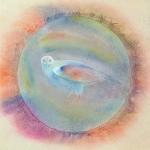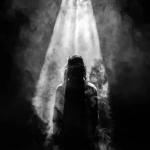
From: Flickr
(Spoiler alert.) “Eternity… Believe it or not, it’s as real as shit.” So dawns Will Farnaby’s moment of clarity on a guided psilocybin trip at the end of Aldous Huxley’s utopian novel, Island. (1) Set in a Southeast Asian island society founded by a Rajah yogi and a Scottish humanist physician where everything is oriented toward sustainable human flourishing, Pala is a place where people are socially supported in trying to behave as if they “were essentially sane and naturally good.”
More idealist manifesto than adequately plotted narrative, Huxley’s vision of human society in Island could very well serve as a model for a Spiritual Naturalist paradise. The book is written in a conversational style between shipwrecked Englishman Will Farnaby and various denizens of Pala who happily discuss and demonstrate Palanese ways with the outsider.
In stark contrast to the consumerist, comfort-worshiping, technologically advanced society he wrote about in Brave New World, notable features of Palanese society include ecologically sensitive technological development, sustainable agriculture, mutually affirming tantric sexuality, limited population, scientific rigor, healthy skepticism, early mental health assessment and intervention, non-violence, and an experiential spirituality that includes formation, rites of passage, and individual and communal ritual without the burden of dogma.
Mind you, I have lived too long and seen too much to be without mixed feelings regarding utopian idealism. I enjoyed Island as a thought experiment considering what kinds of helpful measures might be feasible on a larger scale within human society. Yet, while he does offer a welcome alternative to the values and priorities of the Brave-New-World-Like society I already live in; in my opinion, Huxley pushes the envelope at certain points beyond what reality can bear. But he wrote the book, not me, and any envelope pushing is in service of the continuity of his ideals. One can dream, right?
Of particular interest to me as a Spiritual Naturalist practitioner, particularly in the context of my work as a hospice chaplain, are some of Huxley’s observations about religion and health. The following are some examples.
Pala has “…no established church, and our religion stresses immediate experience and deplores belief in unverifiable dogmas and the emotions which that belief inspires.”
Amen. And yet—one of the characters goes on—given the nature of human beings, religions are inevitable. People “…can’t help making symbols. That’s what the human brain is there for—to turn the chaos of given experience into a set of manageable symbols.” Making use of the symbols in life affirming rather than life-limiting ways, is more important than prioritizing one set of symbols over another. As a chaplain, I sit with people in symbol-making space on a daily basis.
Written in 1962, Huxley’s philosophy of dis-ease and healing in Island (with a hat tip to Mahayana Buddhist teachings on the inter-relationality of phenomena) considers the whole person—body, mind, spirit—well before a holistic approach was acknowledged in mainstream Western medicine.
“I” am a crowd, obeying as many laws
As it has members. Chemically impure
Are all “my” beings. There’s no single cure
For what can never have a single cause.
The following description of cancer is both scientifically accurate and spiritually attuned. I have not encountered a better one.
It’s what happens when part of you forgets all about the rest of you and carries on the way people do when they’re crazy—just goes on blowing itself up and blowing itself up as if there was nobody else in the whole world. Sometimes you can do something about it. But generally it just goes on blowing itself up until the person dies.
Near the end of the book, Farnaby attends at the deathbed of a woman. Beginning to come to terms with his own fear of death and some of the ways this fear has played out in his relationships, career, and addictions, Farnaby engages in conversation with a young girl about the phenomena of human birth and death. Labor and birth is a comparison I often draw on with loved ones keeping vigil near a dying person. Both are a natural part of life. Both happen on their own timeline. Human beings already know how to give birth and to die even though we think we don’t. Witnessing human births and deaths has been of great value to my own process of integration.
As Will Farnaby comes out of his mushroom trance to find the forces of spiritualism, militarism, and economic progress actively invading Pala, the novel closes with a hopeful affirmation: “Disregarded in the darkness, the fact of enlightenment remained.” As it was in the beginning, the refrain of Huxley’s invitation to “Attention,” “Here and now, boys,” and “Karunah” rings out truer than ever.
__________
Learn about Membership in the Spiritual Naturalist Society
The Spiritual Naturalist Society works to spread awareness of spiritual naturalism as a way of life, develop its thought and practice, and help bring together like-minded practitioners in fellowship.
SNS strives to include diverse voices within the spectrum of naturalistic spirituality. Authors will vary in their opinions, terms, and outlook. The views of no single author therefore necessarily reflect those of all Spiritual Naturalists or of SNS.
__________
Notes:
(1) Aldous Huxley, Island, New York: Harper Perennial Modern Classics, 1st edition (2009) (Available from Amazon.com).













